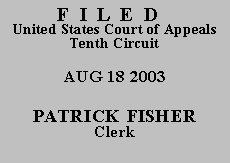

| UNITED STATES OF AMERICA,
v.
CANDI JANE SISK |
No. 02-3204
(D.C. No. 00-CR-40024-17-SAC) |
In general, we review for clear error a district court's factual determination as to whether a defendant was a minor or a minimal participant in a drug conspiracy, and we give due deference to the court's application of the sentencing guidelines to the facts. United States v. Garcia, 182 F.3d 1165, 1175 (10th Cir. 1999). Because Sisk failed to object to the PSIR's characterization of her role in the offense as minor, however, she has waived the issue on appeal unless the district court committed plain error. See United States v. Ivy, 83 F.3d 1266, 1297 (10th Cir. 1996) ("We have repeatedly held that if a defendant fails to object to [her] presentence report, [she] waives [her] right to challenge the district court's reliance on it, unless the district court's decision to do so amounts to plain error."). It is well-established that, to constitute plain error, a district court's decision must be "particularly egregious, as well as obvious and substantial." Id. (quotation omitted).
Based on our review of the undisputed facts of the instant case, as set forth in the PSIR, it is far from obvious whether Sisk was a minimal versus a minor participant in the conspiracy. As described in the PSIR, Sisk was a "runner" in the drug conspiracy, she had obtained the necessary paraphernalia for the manufacture of methamphetamine, and she was aware of the conspiracy. (13 R. at 17 ¶ 59.) Even if the district court erred in concluding that Sisk was a minor, rather than a minimal, participant, its error was not "particularly egregious, obvious, or substantial," Ivy, 83 F.3d at 1297, so as to constitute plain error. Accordingly, we AFFIRM.
The mandate shall issue forthwith.
ENTERED FOR THE COURT
Carlos F. Lucero
Circuit Judge
*. The case is unanimously ordered submitted without oral argument pursuant to Fed. R. App. P. 34(a)(2) and 10th Cir. R. 34.1(G). This order and judgment is not binding precedent, except under the doctrines of law of the case, res judicata, and collateral estoppel. The court generally disfavors the citation of orders and judgments; nevertheless, an order and judgment may be cited under the terms and conditions of 10th Cir. R. 36.3.
1. U.S.S.G. § 3B1.2 provides:
Based on the defendant's role in the offense, decrease the offense level as follows:
(a) If the defendant was a minimal participant in any criminal activity, decrease by 4 levels.
(b) If the defendant was a minor participant in any criminal activity, decrease by 2 levels.